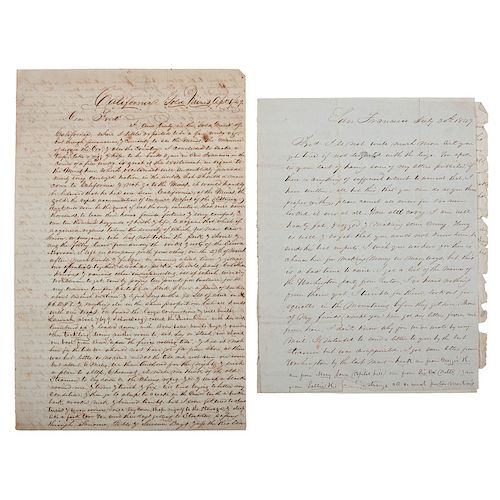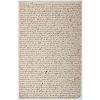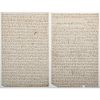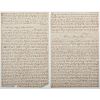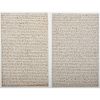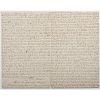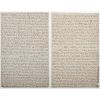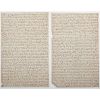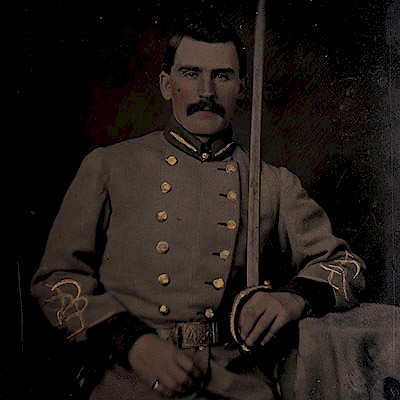California Gold Rush Correspondence
About Seller
6270 Este Ave.
Cincinnati , OH 45232
United States
With offices in Cincinnati, Cleveland and Denver, Cowan’s holds over 40 auctions each year, with annual sales exceeding $16M. We reach buyers around the globe, and take pride in our reputation for integrity, customer service and great results. A full-service house, Cowan’s Auctions specializes in Am...Read more
Two ways to bid:
- Leave a max absentee bid and the platform will bid on your behalf up to your maximum bid during the live auction.
- Bid live during the auction and your bids will be submitted real-time to the auctioneer.
Bid Increments
| Price | Bid Increment |
|---|---|
| $0 | $25 |
| $500 | $50 |
| $1,000 | $100 |
| $2,000 | $250 |
| $5,000 | $500 |
| $10,000 | $1,000 |
| $20,000 | $2,500 |
| $50,000 | $5,000 |
| $100,000 | $10,000 |
About Auction
Jun 22, 2018
Cowan’s American History: Premier Auction, scheduled for June 22, 2018 is comprised of early photographs, documents, manuscripts, broadsides, flags, and more dating from the Revolutionary War, the Civil War, Late Indian Wars, World War I and II and beyond. Cowan's Auctions dawnie@cowans.com
- Lot Description
Lot of 2 letters. The first is 16 pages, closely spaced, on 8 x 12.25 in. paper, with postscript at the end signed "L. Stowell," but throughout each section is signed "Venture," presumably in its standard meaning of a 'daring undertaking.' Over a period of three months or so, "Venture" adds sections to this lengthy narrative, until, he says, he can get to a place when the mail is leaving. And even at that, he complains near the end of the letter that some mail seems to take 6 months to arrive in California. Addressed to "Fred," the letter begins:
"California Gold Mines, Apr. 6, 1849"
"I am truly in the 'Gold Mines' of California, where I little expected to be a few weeks ago, but through persuasion, & curiosity to see the mines, the manner of diggin 'the Oro,' & also the country, I concluded to make a trip, take a dig, & hope to be back again in San Francisco in the course of a few weeks. So great is the excitement, in regard to the mines here, which excitement will undoubtedly pervade nearly every civilized nation in the world, that should a man come to California & not go to the mines, it would hardly be believed that he had ever seen California, as the mines, the gold, the rapid accumulation of immense masses of the glittering dust will soon be the greatest, if not the only incentive, that will cause thousands to leave their homes, friends, fortunes & every comfort, & run ten thousand hazards, of health & life, to acquire that which is acquired, requires labour, the severity of which no man can know, or imagine, who has not taken the pick & shovel & dug the 'filthy lucre' from among the rocks & roots of the Sierra Nevada."
He notes that he and four friends left on the 27th of March after acquiring the equipment they would need. They loaded it onto a "large commodious & well-built Launch (about 7 by 9 I should say) called the 'Susan Ann'" (although he does not say where) and set out for the mines. They arrived at the bay at San Joaquin. He continues...
"This I’ve no doubt, will at no distant day be something of a city, but at present consists of 2 or 3 houses & as many tents, with hardly inhabitants enough to be perceivable. There is much beautiful land upon either side of the Bays, of great fertility; at present covered with a thick carpet of green grass, upon which you may see herds of cattle feeding & occasionally a herd of elk, antelope & various other kinds of game with which the country abounds. There are certainly some of the most lovely locations for residences; the most beautiful rolling land, & quiet vales, with here & there a green oak spreading wide his ponderous branches, & the most inviting shade man ever lulled beneath, which calls upon the weary traveler to halt & take a snuff of the mountain air, or old oceans’ cooling breeze."
Once they reach Stockton, they realize they still have to transport their equipment, provisions, etc. another 60 to 70 miles overland. They purchase a couple of horses, but it takes most of the first day to figure out how to pack them. The first day was over a level plain dotted with trees. He describes it as being very much like an orchard. Then they reach the foot of the mountains and the gorges that cut into them. There is a trader's tent at the end of the gorge with provisions and liquors to supply the miners. Once they get into the mountains, they encounter a new risk - having their horses stolen by Indians.
"The Indians of California (The Diggers) are no warriors, have no weapons but their bows & arrows & use even those much less skillful then the Indians east of the Mountains. They live upon roots & nuts of various kinds & grass, & are more like animals than human beings; they are of different tribes & speak a different language every twelve miles, which is very singular, & it is in that only that they differ. Old Bollo tribe are the only ones that are hostile about here & they only steal, which they are very good at, but will soon have to stop or we shall all turn out & drive him off out of the way."
They find out quite by accident that maintaining a large fire all night seems to discourage such theft, as it seems to indicate that someone is awake and guarding the animals (which they weren't).
He then describes the beginning of the digging. There is a definite "learning curve" to gold panning. He says that the majority of miners are making less than $5 or 10 per day, and some only making enough for supplies to keep digging.
"Angel’s Creek April 17th 1849"
“The Yellow fever is still prevailing to a great extent & many are getting a little sick at the stomach & leaving, whilst hundreds are daily arriving...Much prospecting done, do a good deal of that ourselves, that is to look for better diggings, but as a general thing, those who run about from place to place get but little gold; & those who pick their place & dig until they dig it out, make the money.”
Yet they seem to be getting restless and ready to move on, but they have a lot of difficulty getting to other diggings since the rivers are running too high to cross with the spring melt.
"Murphey’s Diggins April 25th 1849"
“… I am quite in love with this quiet little vale, 'shut out, as it were' from the rude world of Alpine hills: Aye, ‘tis a sweet spot, its hills, its vills, its groves, & shades, its vales & flowers. I’ve roamed over their sides, quaffed pure water from the bubbling fountain, slumbered beneath their green bought & plucked sweet flowers from the fertile vallies[sic] of this fairy land. But hold on! Off the track, guess I’ve done some other things too since we’ve been here; been in mud & water up to may arms digging for 'the root of all evil' which is quite plentiful in some parts of this fairly land. Strange, man’s response to evil, but we’ll try & rid the country of this evil, by striking directly at the root, & no doubt it will be well nigh done in a short time, so numerous will be the co-operators in this great work…”
"Carson’s Creek, May 6th, 1849"
“…[L]et me tell you, that it is the hardest work any white man’s ever done; I’ve seen some rough times before I ever saw California, but of all the work ever I done, or have seen done, gold digging in California is infinitely harder than the hardest. You have only to imagine the bed of a creek, say from 40 to 100 feet in width, covered with men (of all sorts & colors & from all quarters of the globe) for the space of 1-1/4 miles (about the extent of the diggins here) & on much of the ground they are so thick, that you are in danger of getting a sly punch under the fifth rib with a pick-handle, or a shovel full of mud slap on top of your head, as you are down in your hole, tugging away at a big rock, baling out water or thrusting your arms down into the mud & water, rooting away with your fingers among the gravel & in the crevices of the rocks, eyes intent upon every handful of dirt looking for a lump which is a powerful antidote for the back-ache; & thus you have a faint picture of we diggers; & a more perfect disguised set of men could not be; unshaved (in accordance with the good look.: 'Mar not the corners of thy beard'), unshaven, unwashed, with 3 coats of dirt & grease constantly on hand (& face also) some bare-foot, some slip-shod, a red shirt & ragged pants, with various shaped old hats drawn over our faces, giving us a very ridiculous appearance I assure you. I would give a weeks diggings for a Daguerreotype of the party, for it would be more laughable than Yankee Hill in his best. But this is a democratic country, do as we please, look as we please & the neighbors make no remarks as we’re not obliged to pay particular attention to the shape of our boots or the set of our coats, & standing collars & kid gloves are not on the invoice of 'Goods for the diggers.'"
“The Chillanoes & Sonoreans are getting very numerous here & we are inclined to think they will have to leave soon or we shall wait upon them to lay down the shovel & the hoe & 'vamos.' We learn from good authority that nearly all of the inhabitants of Sonora and many from other parts of Mexico is on their way here…”
Maybe being a transplanted Easterner made the ‘49ers oblivious to the fact that merely a year or two before they arrived to dig for their fortunes, California WAS part of Mexico. He goes on: “I hope some measures will be adopted to keep them out, for it is an outrage to permit them to come in here, for the sole purpose of carrying off the gold & they can dig much more than any other people, having been raised to that kind of labour & they can live on what we would starve on. The miners are quite incensed against them & are only waiting for them to give some provocation & then the fray will commence & every foreigner had better be missing about that time…”
"Pueblo San-Jose May 16th, 1849"
They left the diggings on May 9th. Stockton has "improved" with a lot of canvas "houses," which he notes will not stand up to the next rainy season's storms.
"There are some very fine gardens here, tho much neglected on account of the mines, fruits of many kinds, grapes, & vegetables, the best in the world can be raised here with but little labour, & in great quantities."
"Santa Cruze May 18th, 1849"
He decided to see some of California, as long as he was there. He went to see the redwoods that Fremont described, many over 12 feet in diameter and 275 feet high. He describes some of the older trees that were burned out, though still growing, but leaving a shell. One of those was home to a shoemaker for years, and "it was quite a respectable house, & a mighty tall steeple."
"San Francisco June 5th, 1849"
“…there is a heap of labour & time saved here..., for we don’t have to undress at all to sleep in California beds, put on a suit of clothes & never take them off till they wear off. O, ye see you folks in the city don’t know anything of real high life…”
"[Sauceleto] July 5th, 1849"
“…I should like to have spent the 4th with you, old feller, for there was but little going on here, save the firing of a few guns & burning cart-loads of fire crackers, with a host of drunken men about the streets, which is no rarity here at all, liquor flows in California… Gambling is the principle amusement & that is done up in great style, 200 ounces at a time, common betting.”
"San Francisco July 29th, 1849"
This is the last section, in which he discusses the mail taking up to 6 months to arrive - if ever. The postscript is dated the following day, when a mail packet is leaving, so he will get this letter on its way.
A sometimes sarcastic, often witty, very readable, and certainly long letter from the gold fields of California.
The second letter is much shorter (3pp) and on standard 8 x 10 in. paper. It begins where the previous one left off, San Francisco, July 30, 1849. This one signed "L. Stowell," and is addressed to "F.S.M. Willoughby." Apparently in the last letter Stowell received from his friend, Fred suggested that at least parts of his letters be published. We presume that Fred received at least one letter describing the journey from Washington (DC) to California. Stowell says that Fred can do what he thinks proper with the letters, but "... please correct all error for I've never looked it over at all." Much of this letter is more personal, noting those from whom he had received letters. And he has other concerns on his mind:"Fred, by thunder, I'd give a thousand to see some of the girls, for there is none here worth a curse. I'm going to make some money & go home to enjoy it for this is no place, as yet, to enjoy ones self at all...Kiss the girls for me Fred - for heavens sake & mind & tell who it's for when you do it, & mind what else you do. Pick out one that will suit me & tell her to hold on a while or come out here, which I'd like better for without joking I want a wife & I'd have one if [one] was to be had here, & not choose much either."
First letter in good condition, though some ink "burn" developing. Second has one edge a bit frayed that does impact a few words.Condition
Eliminate the Hassle of Third-Party Shippers: Let Cowan's Ship Directly To You!
If you'd like a shipping estimate before the auction, contact Cowan's in-house shipping department at shipping@cowans.com or 513.871.1670 x219. - Shipping Info
-
Buyers are required to pay for all packing, shipping and insurance charges. Overseas duty charges are the responsibility of the successful Bidder. Be aware that for larger and/or valuable items, shipping charges can be substantial. - If there is no shipping amount on listed your invoice, you will need to make arrangements to pick up or ship your purchase through an alternative shipping company. Our shipping department can be contacted at 513.871.1670 (ext. 219) or email shipping@cowans.com. - Shipping charges include insurance for your order while in transit. If you have private insurance we will adjust your charge to include only packing and shipping. - Please allow 14 – 21 days after payment to package and ship your purchase as carefully as possible.
-
- Buyer's Premium



 EUR
EUR CAD
CAD AUD
AUD GBP
GBP MXN
MXN HKD
HKD CNY
CNY MYR
MYR SEK
SEK SGD
SGD CHF
CHF THB
THB